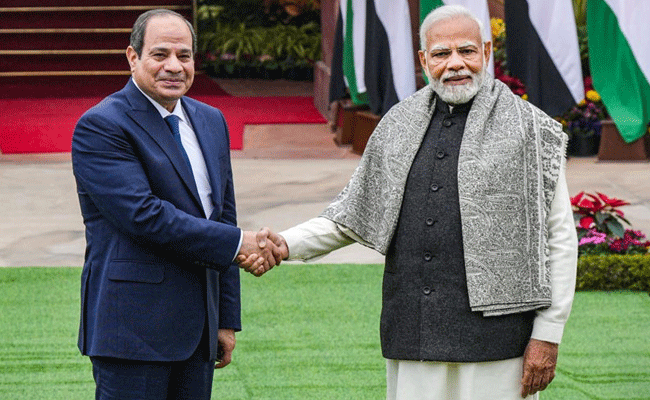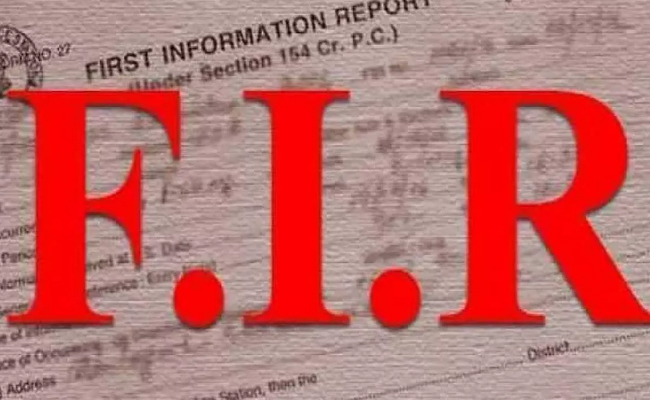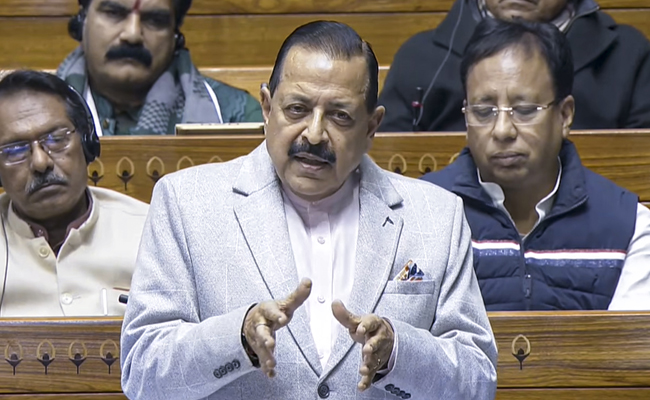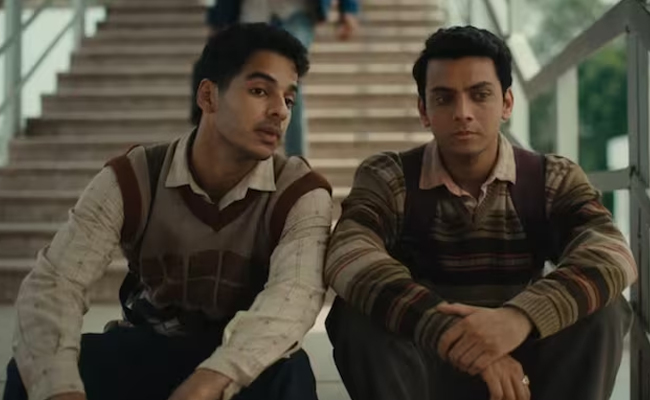New Delhi (PTI): Egyptian President Abdel Fattah El-Sisi on Thursday joined a select group of world leaders to have graced India's Republic Day celebrations.
Sisi, as the chief guest at the Republic Day celebrations, watched the colourful parade at the majestic Kartavya Path along with President Droupadi Murmu, Prime Minister Narendra Modi and a host of other leaders.
It was the first time that an Egyptian president is the chief guest at the Republic Day celebrations.
Sisi held wide-ranging talks with Modi on Wednesday, a day after he arrived here on a three-day visit.
Every year, India invites world leaders to attend its Republic Day celebrations.
There was no Republic Day Chief guest in 2021 and 2022 in view of the COVID-19 pandemic.
In 2020, then Brazilian President Jair Bolsonaro was the chief guest at the Republic Day celebrations.
In 2019, South African President Cyril Ramaphosa was the chief guest at the Republic Day parade, while in 2018, leaders of all 10 ASEAN countries attended the celebrations.
In 2017, Crown Prince of Abu Dhabi Sheikh Mohamed bin Zayed Al Nahyan was the chief guest at celebrations, while then French President Francois Hollande graced the occasion in 2016.
In 2015, then US President Barack Obama watched the parade.
In 2014, then Japanese Prime Minister Shinzo Abe was the chief guest at the celebrations, while Bhutan king Jigme Khesar Namgyel Wangchuck attended the parade in 2013.
The heads of state and government who have attended the Republic Day celebrations include Nicolas Sarkozy, Vladimir Putin, Nelson Mandela, John Major, Mohammed Khatami and Jacques Chirac.
The then British Prime Minister John Major had attended the celebrations in 1993, Nelson Mandela participated as then South African President in 1995 while South Korean President President Lee Myung Bak witnessed the parade in 2010.
In 2008, Sarkozy participated in the celebrations as French President, while another French President Chirac graced the occasion in 1998.
Other world leaders who have attended the celebrations include Nepal's King Birendra Bir Bikram Shah Dev in 1999, Iran's then President Mohammed Khatami in 2003, then Indonesian President Susilo Bambang Yudhoyono in 2011 and President of Maldives Maumoon Abdul Gayoom in 1991.
Let the Truth be known. If you read VB and like VB, please be a VB Supporter and Help us deliver the Truth to one and all.
Bengaluru (PTI): A woman was booked on charges of obstructing a police inspector from discharging his official duties and threatening to commit suicide if he did not accept her love proposal, police said on Wednesday.
The 45-year-old inspector attached to the Ramamurthy Nagar Police Station here alleged that the woman repeatedly harassed him, they said.
According to his complaint, the harassment began on October 30, when he started receiving calls from an unknown woman from multiple phone numbers.
During these calls, she allegedly spoke incoherently and claimed to have close links with several highly placed individuals, including the Chief Minister, Deputy CM, Home Minister and other political leaders.
Police said the woman sent photographs via WhatsApp purportedly showing herself with these dignitaries and claimed she could use their influence to compel the inspector to accept her proposal. She also allegedly threatened to use her contacts against him if he refused.
ALSO READ: “Bleeding on the road, I begged for help but no one came”: Bengaluru woman recounts husband’s death
The inspector said that he advised her to visit the police station and submit a written complaint if she had any grievance. However, she did not do so and instead continued to repeatedly call and send messages, which disturbed his official duties, the FIR said.
According to the FIR, on November 7, the woman allegedly visited his office and handed over an envelope containing some tablets along with handwritten letters. The letters contained emotionally charged and inappropriate content, and the woman claimed they were written using her blood, indicating obsessive behaviour.
Despite being clearly informed that the number she was contacting was an official departmental number meant for public service, she allegedly continued making unnecessary calls and messages, causing mental harassment and obstruction to his day-to-day duties, he alleged.
During the inquiry, police learnt that the woman had allegedly exhibited similar behaviour with other police and government officials in the past, it stated.
On December 12, she allegedly went to his police station and shouted and threatened to commit suicide and ruin the inspector's career if he did not respond to her proposal, prompting him to lodge a complaint.
"Based on the complaint, a case was registered against the woman under Sections 132 (assault or criminal force to deter a public servant from discharge of duty), 351(2) (criminal intimidation) and 221 (obstructing a public servant in discharge of public functions) of the Bharatiya Nyaya Sanhita at the Ramamurthy Nagar Police Station. The matter is under investigation," police said.





